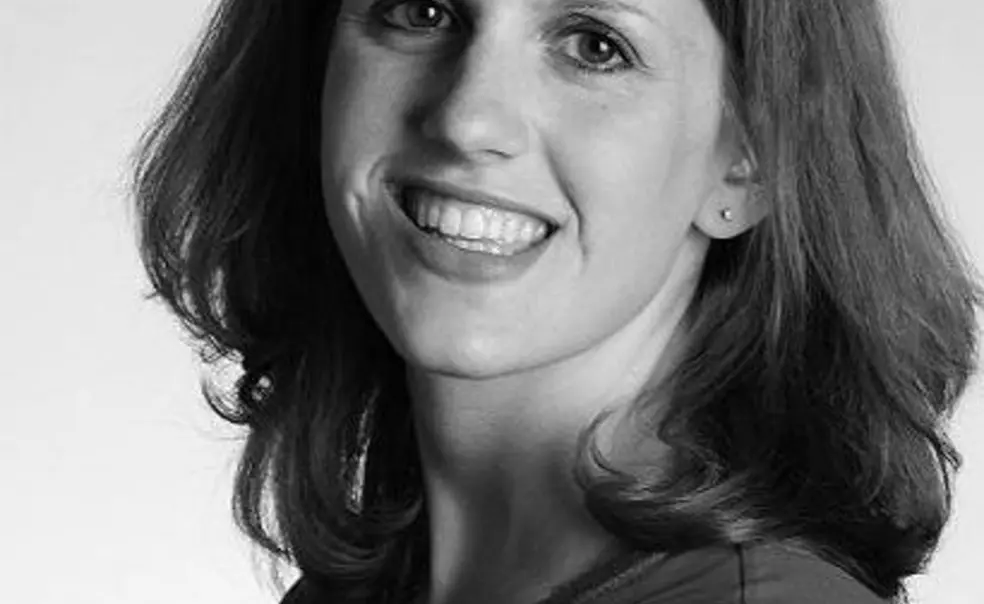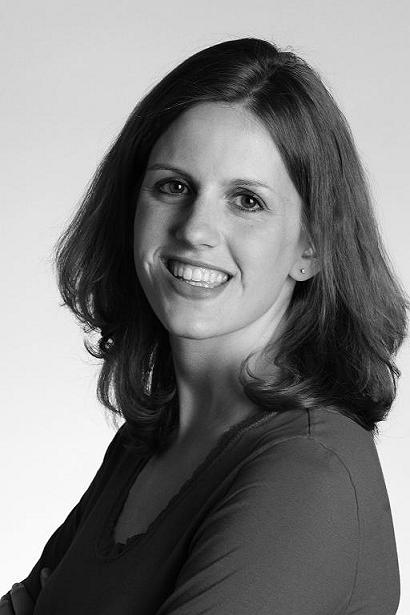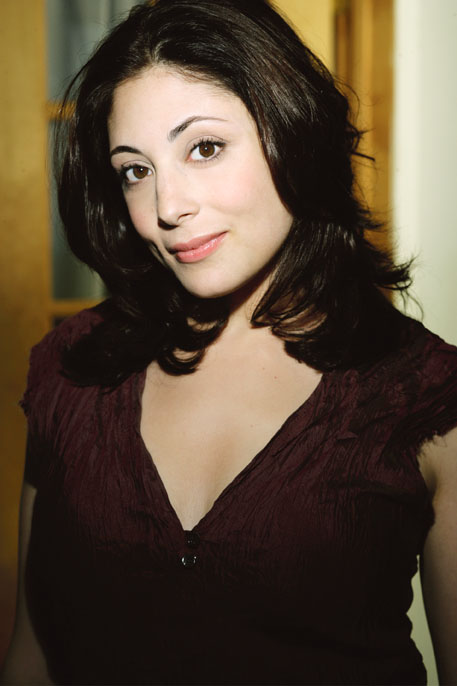Young playwrights take center stage
In February and March, three alumni playwrights — Lia Romeo ’03 , Branden Jacobs-Jenkins ’06 , and Najla Said ’96 — premiered new works that touched on subjects ranging from love to minstrel performers and personal identity. Below are snapshots of the plays and their creators.
Lia Romeo ’03's latest play, "Green Whales," premiered in March at the Unicorn Theatre in Kansas City, Mo. She has called it a "romantic comedy about pedophilia and alcoholism and death" in which she explores the idea that "whatever issues each of us has, there's someone out there who will still want to love us ... but ... this love will not necessarily be enough to redeem us." Romeo, who earned an MFA in playwriting from Rutgers University, was the playwright-in-residence at Playwrights Theatre of New Jersey for the 2008-09 season. She's currently working on her first novel, titled Dating the Devil.
Green Whales: In the opening scene of the play, two sisters, Karen and Joanna, are returning from their mother's funeral. A love story centers on Karen, a brilliant but dateless 38-year-old philosophy professor who suffers from Turner syndrome -- a genetic disorder that makes her look like a teenager. Her wacky alcoholic sister, Joanna, comes up with a plan to find Karen's "perfect" match -- a man with pedophiliac tendencies -- while navigating her own tenuous relationship. From the reviewers: Green Whales, wrote a reviewer, is "a daring new romantic comedy ... [Romeo's] waggish sense of humor serves to temper the play's unseemly aspects." Romeo, wrote another critic, "shows a lively focus for bridging old style (if sometimes sitcom-y) comedy with newer, more volatile material." In Romeo's words: "I'm often drawn to writing romantic comedies, because I think they're really interesting as a repository of all of our cultural fantasies about what love and romance are supposed to look like. And one of the hallmarks of romantic comedy -- and of our fantasies about romance in general -- is this idea of finding someone who's uniquely perfect for you in ways that no one else in the world is. So it seemed to me that a pairing between a man with pedophiliac tendencies and a women with a condition that made her look younger than she really is (Turner syndrome) would exemplify that idea in a way that was funny and disturbing." 
Branden Jacobs-Jenkins ’06's play "Neighbors" premiered in February at the Public Theater in New York City. A 2009 member of the Public Theater's Emerging Writers Group and recipient of the 2009 Princess Grace Award for Playwriting, the Brooklyn-based Jacobs-Jenkins holds a master's in performance studies from New York University. The reading of his new play, "Appropriate," will be held April 26 at the Public Theater. In June, Performance Space 122 in New York City will produce "The Octoroon," his adaptation of Irish playwright Dion Boucicault's controversial 19th-century melodrama about Americans. (The show runs from June 18-July 3.)
Neighbors: When the Crows, a family of rowdy and tacky black actors in blackface, move in next door to Richard Patterson, he is not happy. A black man married to a white wife, Patterson is a teacher of Greek political thought and Greek tragedy. The Crows' peculiar acts disturb Patterson's post-racial life. An experience at Princeton, in part, inspired this play, said Jacobs-Jenkins: On the first day of an African-American drama class, he recalls Professor Daphne Brooks saying, "'I thought about starting this class with blackface minstrelsy, but instead ...' And I remember thinking, 'Wait! What?!' And I guess I've been trying to answer that, 'Wait! What?!' ever since, and this play was part of that." Some audience members stormed out before the end of the performance, noted Jacobs-Jenkins; others were emotionally moved by the play and stayed after the show to talk to actors. "Either people loved it or they totally hated it, though most people were pretty positive," he said. The show was sold out and was extended for a week. From The New York Times: "The artistic director of the Public, Oskar Eustis, ... call[ed] 'Neighbors' a 'really, really exciting intellectual investigation by a fascinating new young writer.'" In Jacobs-Jenkins' words: "If anything, I think I was just asking questions with this play -- questions about the value, possibilities, and limits of the theatre as a historical form, institution, and community; questions about the audience, the idea of audience, and its expectations. I tell people over and over again that this play is just a (slightly cynical) treatise about the theater. ... So basically, I just wanted to give people permission to sit with a constellation of ideas and images -- most of which we automatically recognize as 'uncomfortable' or 'inappropriate' and as having something to do with 'blackness' -- and feel things and not necessarily have any questions answered but provide a space/time for them to answer questions for themselves."
Najla Said ’96's one-woman off-Broadway show "Palestine" called a "coming-of-age story about [her] journey to become an Arab-American on her own terms" by The New York Times premiered in February at the Fourth Street Theater in New York City. An actress who has appeared in plays, on TV, and in film, Said will appear in another play about the Middle East, "Prophecy" in June, also at the Fourth Street Theater. "Palestine," her first play, started as a journal entry she wrote after her father died about a trip her family took to Gaza when she was 18. Said is turning "Palestine" into a memoir.
Palestine: The daughter of the late scholar and Palestinian advocate Edward Said â57, Said shares her struggle coming to terms with her identity as an Arab-American and describes growing up in a comfortable Upper West Side life with a host of Jewish friends and a trip in 1992 with her family to Gaza -- her first time to Palestine -- that coincided with her father's diagnosis with leukemia. Reluctant to go, Said said the journey changed her. She recounts her family's meeting with Yasir Arafat, taking pictures of refugees in Gaza, and walking the streets of the Old City in Jerusalem. From The New York Times: "'Palestine' ... offers no remedies for Mideast tensions or blanket assessments of a complex situation. Ms. Said just tells her tale (with generous helpings of humor), which includes attending an elite Manhattan prep school (Trinity), where she blended in with her Jewish friends; becoming anorexic at 15; and visiting the West Bank and Gaza, Jordan and Lebanon with her family, where her priority was often getting in some beach time rather than analyzing the geopolitical situation." In Said's words: "In the play I use Sept. 11 as the event that sort of changed how people perceived me in that I suddenly became an Arab-American. So professionally and in general I was given an identity that I didn't really understand and didn't know what to do with. I wanted to explore what it meant. Not only was it Sept. 11 [but also] my father passing away, and the Iraq war, and all of these things coming together at the same time -- and people assuming that I was this person and that person and politizing me. So I just wanted to explore that. ... Also in many ways since my father died [in 2003] people have been asking my opinion ... on Middle East politics. I'm an actress and a writer. I can't really speak to that. ... I'm not an expert. Part of me wanted to answer those people and say, 'This is who I am and this is what I think. And this is who my father is.' I go out of my way to clear up a lot of misunderstandings that really hurt my family."














No responses yet